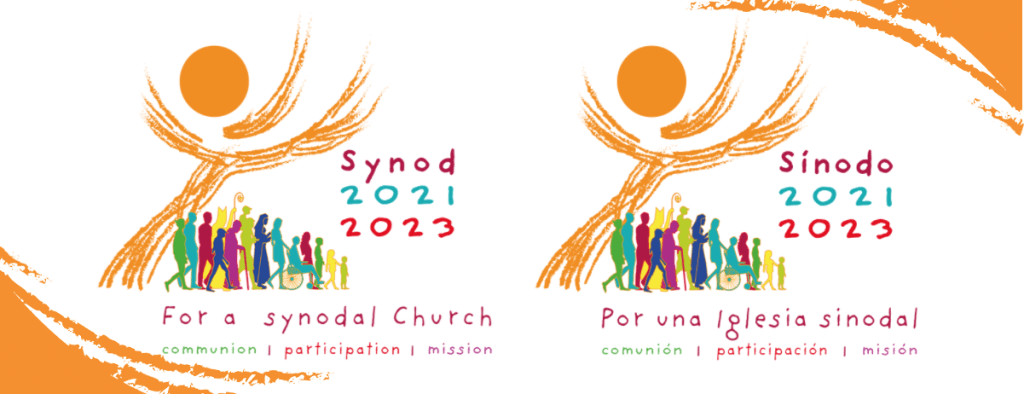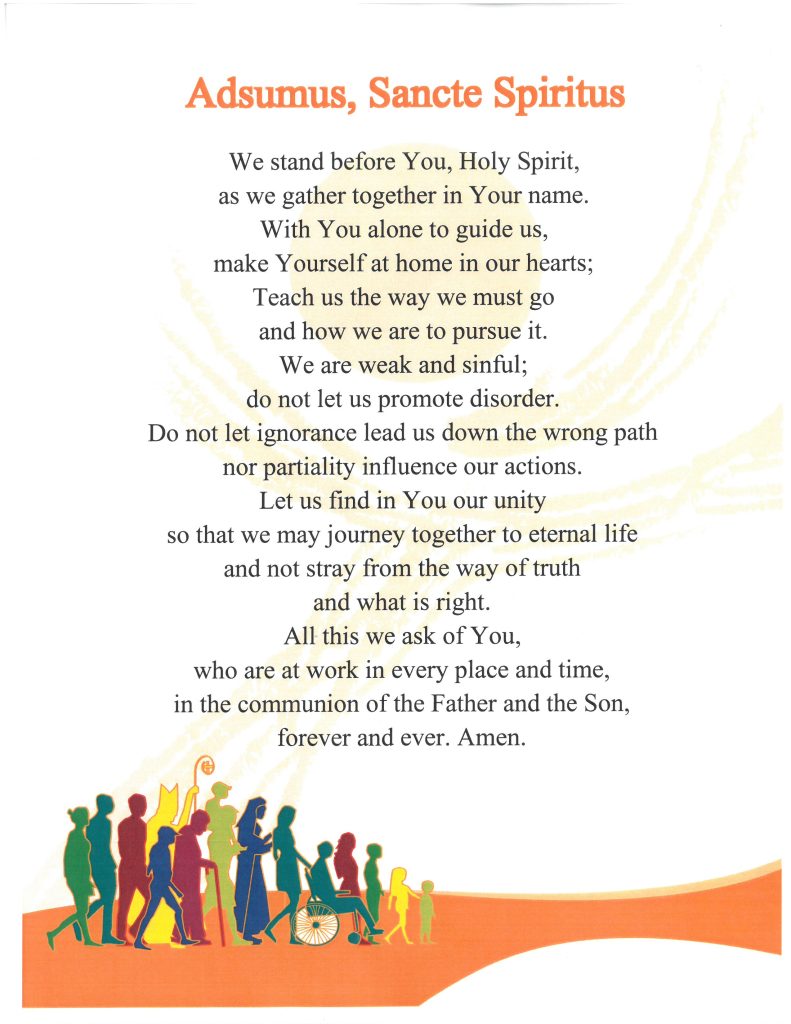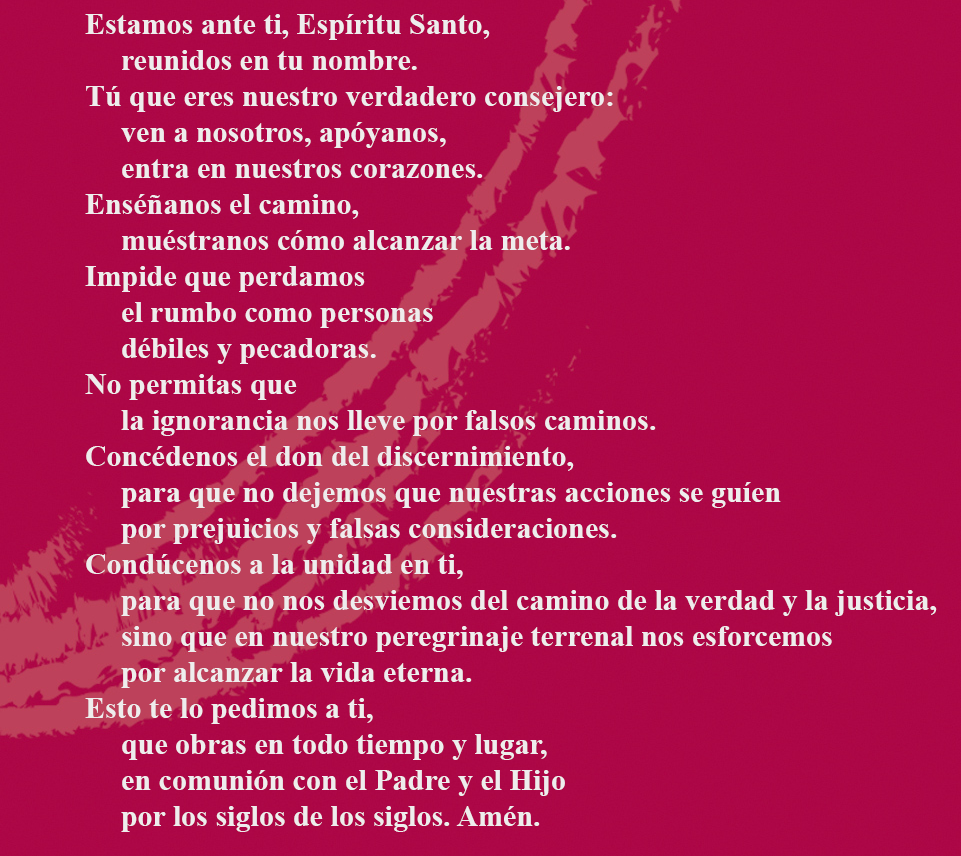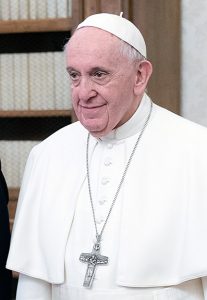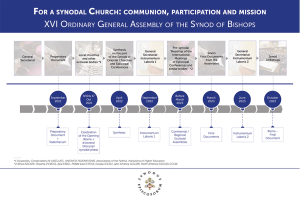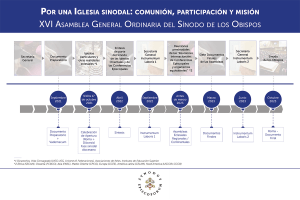Synod Homily, Bishop Spalding
(October 17, 2021)
Prayer for the Synod: Adsumus Sancte Spiritus
Homilía Sinodal, Obispo Spalding
(17 de octubre de 2021)
Oración por el Sínodo: Adsumus Sancte Spiritus
FAQ/Preguntas Frecuentes
– To celebrate and reflect on the emerging realities and experience of the diocesan journey of travelling together on the synodal path.
– To highlight the main themes of the diocesan consultations with a chosen group of representatives from different communities of the diocese.
– To involve members of diverse communities (parishes, ministries, movements, schools, clergy, religious communities, the marginalized, young persons, cultural groups, etc.) in reflecting on the experience and input of the consultation process, in view of the diocesan synthesis on the basis of the feedback received from across the diocese.
– To listen to what God has been saying through the people of the diocese, to discern his will for the local Church and the pathways he is inviting the Church to follow in the diocese towards deeper communion, fuller participation, and more fruitful mission.
– To bring out the best practices, synodal pathways, and a new momentum and vitality towards being a more synodal Church of journeying together, mutual listening, and co-responsibility.
– To develop the diocesan synthesis that conveys what was shared by the People of God during the consultation process in the diocese, as a contribution to the current Synodal Process of the entire Church. (Vademecum, Appendix C)
– How growth in journeying together can be improved through listening and experiencing (see PD, 26).
– The specific questions for dialogue and discussion are based on the themes proposed by the Vatican (see PD, 30) and center on the three vital pillars of a Synodal Church: communion, participation, and mission (see Vademecum, 1.4).
– Although less directed topics may be raised, not all necessarily will be part of the ongoing dialogue, since the traditional truths of Christian doctrine are not part of synodal discussions (see Pope Francis, Let Us Dream: The Path to a Better Future, 93).
To further the spirit of synodality, our community will join together to meditate on and pray the Adsumus Sancte Spiritus, which is the prayer that began every session at the Second Vatican Council.
Understanding the nature of the synodal process will help reach the goal of synodality. The Preparatory Document and the Vademecum are the principal documents to learn about the Synod on Synodality.
You are invited to participate actively through local listening sessions, which will be hosted at parishes throughout the Diocese of Nashville, as well as an online survey on the Diocesan website.
Phase 1
– Diocesan Phase: October 17, 2021 – June 30, 2022
– Preparatory Phase: October 17, 2021 – December 7, 2021
– Synod Homily, Bishop Spalding (October 17, 2021)
– Appointing Diocesan co-contacts and setting up synodal team
– Discerning and planning diocesan path
– Coordinating parish coordinators
– Diocesan-wide communication
– Consultation Phase: December 8, 2021 – June 4, 2022
– Parish and Group listening sessions
– Online Survey
– Synthesis and Reporting Phase: June 5, 2022 – June 30, 2022
– Episcopal Conference Synthesis Reporting Phase:
July 1, 2022 – August 15, 2022
Phase 2
– Continental Phase: September 2022 – March 2023
Phase 3
– Universal Phase: Beginning October 2023
II. Process of the entire Synod
– Celebrar y reflexionar sobre las realidades emergentes y la experiencia del camino diocesano de caminar juntos por el camino sinodal.
– Resaltar los temas principales de las consultas diocesanas con un grupo elegido de representantes de diferentes comunidades de la diócesis.
– Involucrar a miembros de diversas comunidades (parroquias, ministerios, movimientos, escuelas, clero, comunidades religiosas, los de comunidades marginales, jóvenes, grupos culturales, etc.) en la reflexión sobre la experiencia y aportes del proceso de consulta, en vista de la visión diocesana sobre la síntesis en base a los comentarios recibidos de toda la diócesis.
– Escuchar lo que Dios ha dicho a través de la gente de la diócesis, discernir su voluntad para la Iglesia local y los caminos que invita a la Iglesia a seguir en la diócesis hacia una comunión más profunda, una participación más plena y una misión que de más frutos.
– Poner en evidencia las mejores prácticas, caminos sinodales y un nuevo impulso y vitalidad para ser una Iglesia más sinodal al caminar juntos, escucharnos mutuamente y compartir una corresponsabilidad.
– Desarrollar la síntesis diocesana que transmita lo compartido por el Pueblo de Dios durante el proceso de consulta en la diócesis, como contribución al actual Proceso Sinodal de toda la Iglesia. (Vademécum,, Apéndice C)
– Cómo se puede mejorar nuestro crecimiento al caminar juntos escuchando y viviendo esta experiencia. (ver PD, 26).
– Las preguntas específicas para el diálogo y la discusión se basan en los temas propuestos por el Vaticano (ver PD, 30) y se centran en los tres pilares vitales de una Iglesia sinodal: comunión, participación y misión (ver Vademécum, 1.4).
– Aunque se pueden plantear temas menos dirigidos, no todos necesariamente serán parte del diálogo continuo, ya que las verdades tradicionales de la doctrina cristiana no son parte de las discusiones sinodales (ver Papa Francisco, Let Us Dream: The Path to a Better Future, 93).
Fase 1
– Fase Diocesana: 17 de octubre de 2021 – 30 de junio de 2022
– Fase Preparatoria: 17 de octubre de 2021 – 7 de diciembre de 2021
– Homilía del Sínodo, Obispo Spalding (17 de octubre de 2021)
– Nombrar co-contactos diocesanos y establecer un equipo sinodal
– Discernir y planificar el camino diocesano
– Coordinadores parroquiales
– Comunicación a nivel diocesano
– Fase de Consulta: 8 de diciembre de 2021 – 4 de junio de 2022
– Sesiones para escuchar en la parroquia y en grupo
– Encuesta en línea
– Fase de Síntesis y Reporte de informes: 5 de junio de 2022-30 de junio de 2022
– Fase de Presentación de Informes de Síntesis de la Conferencia Episcopal: 1 de julio de 2022 – 15 de agosto de 2022
Fase 2
– Fase Continental: septiembre de 2022 – marzo de 2023
Fase 3
– Fase Universal: a partir de octubre de 2023
II. Proceso de Todo el Sínodo Synod
Contacts/Contactos
Dr. Brad Peper
Director of the Office of Faith Formation
Director de la Oficina de Formación en la Fe
Erin A. Stracener
Director of the Tribunal
Director del Tribunal

